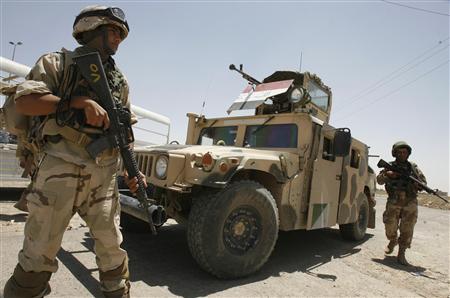A lawmaker and at least 27 others were killed in suicide attack at Baghdad’s mosque
An elderly bandage-swathed suicide bomber blew himself up in Baghdad's mosque, killing a lawmaker and at least 27 others in an attack that was blamed on Al-Qaeda on Monday.
The blast was part of nationwide violence that left 35 dead on Sunday, just days before the conclusion of the holy Muslim fasting month of Ramadan and the Eid al-Fitr festival that marks its end.
An interior ministry official said 28 people were killed and 37 wounded in the attack late on Sunday. A defense ministry official put the toll at 29 dead and 35 wounded.
The suicide blast was quickly condemned by Prime Minister Nuri al-Maliki and parliament speaker Osama al-Nujaifi.
Among the dead were Khaled al-Fahdawi, an MP from western Anbar province allied with the Iraqiya bloc, the interior ministry official said. Elderly men and children were also among the casualties.
Baghdad security spokesman Qassim Atta and Ahmed Abdulghafur al-Samarrai, head of the blue-domed Umm al-Qura mosque that was targeted and one of the founders of an anti-Qaeda militia force comprised of Sunni tribesmen in Baghdad, pointed the finger at Al-Qaeda.
Samarrai, meanwhile, told Al-Sharqiyah television: "I am sure Al-Qaeda was behind this attack ... We will continue our fight against those criminals and unbelievers. They tried to drag the country into sectarian war before." He said he had seen the attacker before at the mosque, describing him as an elderly visitor and adding: "That is why it was so easy for him to enter the mosque."
A car bomb and four roadside blasts in other areas of the capital killed one person and wounded 20 others earlier Sunday, according to the interior ministry official.
Meanwhile, separate gun attacks in the restive central province of Diyala left five people dead, including two policemen, according to an Iraqi army colonel in Diyala's security command centre.
Explosions in Mosul and Tuz Khurmatu, north of the capital, left a policeman dead and six others wounded, security officials said.
Violence is down across Iraq from its peak in 2006 and 2007, but attacks remain common. A total of 259 people were killed in violence in Iraq in July, according to official figures, the second-highest figure in 2011.
